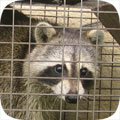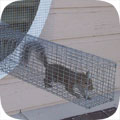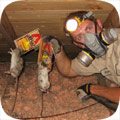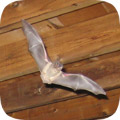If you are having a problem with wildlife in your Corinth home, your best option is to hire a company that specializes in Texas wildlife removal only. This is a specialty business, and regular
pest control companies do not use the proper techniques to solve animal problems. I have spent many years reviewing Corinth, and I recommend the following:
Wildlife X Team
Cell Phone: 940-312-5824
NOTE: If you have a dog or cat problem, call Denton County Animal Services: 940-279-1500

Wildlife X Team specializes primarily in removing animals from attics of homes and buildings - this includes squirrels in attics, raccoons, and rats
or mice in homes. Texas also has a documented problem with
bats in buildings, and Wildlife X Team is specially trained in bat removal. They also perform general wildlife trapping services, such as the capture and removal of skunks or opossums on the
property. Call
940-312-5824 to discuss your critter problem and schedule a same-day or next-day appointment.
When hiring a company to solve your wild animal problem, you want these features:
- Specializes in wildlife removal, not pest control
- Fully Texas and Denton County licensed and insured
- Works 7 days per week (critters don't take weekends off)
- Performs full building inspections: enters and inspects attic
- Performs exclusion repairs, with guarantee against animal re-entry
- Offers cleanup of biohazardous wildlife waste
Wildlife X Team is a full-service Corinth wildlife removal company. This is very different from a regular Corinth pest control company. The pest control companies spray poison to kill insects. This is not at all
similar to wildlife removal. Wildlife X Team performs a full inspection of the home or property, and determines why the animal(s) are there, and if inside a building, how the animals got inside. All
animals (including rodents) are trapped and removed, or if possible, removed from the building using special exclusion devices. Once the animals are gone, preventative repairs are essential, and
cleanup is sometimes recommended.
 | |
Corinth wildlife trapping - it's not as simple as it may seem. It's illegal in Texas to trap without a license. Trap type is very important and there are many different types, bait is somewhat relevant, trap placement
is vital, and there are dozens of small things that are very important to know.
Safety is a concern. Then once the animal is trapped, it must be removed and dealt with in the proper manner according to Texas law. We offer Corinth raccoon removal. Read more about how to get rid of raccoons.
|
 | |
Animals in attics - this is our specialty at Wildlife X Team. Many types of animals like to live in attics. This includes squirrels, raccoons, rats, mice, bats, birds, and even possums. Critters like to go into attics for a safe place to live
and raise their young. Removing animals from attics is very complex work, partly because of the presence of baby animals. If you need Corinth squirrel removal, we can remove all the squirrels from your attic, and seal out any future ones. Read more about how to get rid of squirrels.
|
 | |
Rodent control must be done in a very specific way. First off, the most important thing is that all the openings that rats and mice can use to enter a house be sealed. Then all the rodents must be physically trapped and removed.
Never, ever use poison! Most Corinth exterminators will just use this lazy poison technique to kill rodents, and it causes more harm than good - dead stinky rats, and it doesn't solve the problem. Call us for correct Corinth rat removal. Read more about how to get rid of rats.
|
 | |
Bat removal is a highly specialized task. Texas is known to have colonizing bats who often live in buildings. Bats love attics. If not removed, the colony can grow to a very large size over the years. The bat droppings are often corrosive and
cause health risks. The same goes for bird droppings on or in buildings. We perform Corinth pigeon removal and bird control. But our specialty is Corinth bat removal. We remove 100% of the bat colony and seal the building so that it's totally bat-proof. Read more about how to get rid of bats.
|
 | |
If you have animals inside a house, no job is complete without proper exclusion repairs. If you simply hire a Corinth trapper who only removes the critters, then the problem will return. You need to hire a Corinth wildlife control company that identifies 100% of the animal entry points
into your building, and seals them shut with professional repairs. In addition, in many cases animals have left waste or contamination behind, and you'll want a company that can provide professional cleaning services. Wildlife X Team does both.
|
The above are just some of the services offered by Wildlife X Team. We also trap and remove animals that destroy lawns, such as moles, or digging animals. Sometimes animals like opossums will live under buildings, steal pet food, raid garbage cans, etc.
Read about
how to get rid of opossums. Skunks commonly live under sheds or decks, and set up a den. We can trap and remove them without them spraying. Read about
how to get rid of skunks. Wildlife X Team
also provides dead animal removal in Corinth. If you need help with any other wildlife conflict, from a fox, beaver, groundhog, or any other critter, we can solve it. We also do Corinth snake removal - most of the snakes in Texas are not venomous, but
call us if you want safe removal, or read about
how to get rid of snakes in Corinth. And remember, we are a private business, not Denton County Animal Control Services, so if you have a dog or cat problem, call the County at 940-279-1500.
Denton County animal services does not handle any wildlife issues.
Wildlife X Team
Cell Phone: 940-312-5824
Corinth Wildlife Tip #1:Biology Of Pigeon: Appearance, Biology, Life Cycle, Habitat, Diet, Behavior
Biology, Behavior, and Diet:
Studies reveal that pigeons belong to biological Columbidae family. These birds can be easily identified from their very short necks and bulky bodies. They prefer to live in the slender and short bills. These creatures make quite lightweight nests that are easily attacked by predators, and they end up causing huge damage in very less time. That is why these creatures often look for the safest premises to build their nests and there is nothing more suitable then human habitats. Pigeons prefer to enjoy food from plants, fruits and seeds and all these things are easily available in the residential areas. Note that there are many types of pigeons and some of these also feed on worms and insects. These categories can also be divided into pigeons that only consume fruits while avoiding seeds. Some species of pigeons even love to consume seeds while they do not like fruits. Animal studies reveal an interesting fact that pigeons that consume only fruits usually have a smaller stomach and intestines when compared to the pigeons that eat seeds.
Appearance:
Size of the pigeon also varies as per their type. It is observed that crowned pigeons are the largest species among them all whereas the smallest ones are named as ground doves. Size of these doves can be compared to sparrows whereas the larger crowned pigeons can be compared to the large size adult turkey. The most interesting fact about pigeons is that these creatures do not have gall-bladder in their body. However, they are known for their good memory ability because of which they can easily remember the path to their habitat and other travel routes that they follow for food search.
Habitat:
Pigeons are seen in almost all parts of the world with very few exceptions. Just, for instance, you cannot find these birds in the Antarctic, Arctic and Sahara regions. Almost all other areas of the world are filled with several species of pigeons. These creatures have now adopted a variety of habitats including temperate woodlands, mangrove forests, forests, woods, and grasslands, etc. Pigeons can live on the tree as well as on the land; the one that creates nests on the trees are named as arboreal pigeons, and the others that live on the ground are named as terrestrial pigeons. Few pigeon species also live interchangeably on the trees and ground as well.
Life Cycle:
The average life cycle of pigeons is somewhere around 30 years. The well-grown female pigeon can lay eggs almost 4 to 5 times in one year; it means they can multiply within very less time. The unique thing about these creatures is that both mother and father pigeon take full responsibility for caring for their babies. The most loved place for them to raise babies in attics in the human habitat because this place keeps them safe from predator attacks. That is why most homeowners around the world are in trouble due to pigeon attacks on their property.
Corinth Wildlife Tip #2:
Texas Wildlife Information:Texas State bird: Northern mockingbird
State mammal: Nine-banded armadillo, Texas longhorn, Mexican free-tailed bat
State reptile: Texas horned lizard
State amphibian: Texas Toad
State fish: Guadalupe bass
State insect: Monarch butterfly
Texas, the second largest state in the United States, has multiple climate regions, and thus very unpredictable weather patterns. Not only can Texas have tornados, it can be hit with devastating hurricanes or extended periods of drought. West Texas often sees snow, whereas East Texas is almost always hot and dry. Some areas receive ample rain; some areas receive none. All of this variability means any animals living in Texas need to be ready for just about anything.
The regions in Texas where vegetation is scarce and the sun beats down are the prime locations for the many different lizard species living in the state. Of those, the Texas horned lizard spends its days eating the ample supply of ants which also thrive in the dry environment. The desert tortoise also likes to spend time out in the sun, eating prickly pear fruit. Unfortunately, these critters who love to be out in the open are often prey to one of Texas's largest nuisance animals, the coyote. More a bane to farmers, coyotes are opportunistic creatures, smart enough to evade capture and devious enough to break through inadequate fencing. Other large Texas predators, like the cougar and the bobcat, tend to be leery of people, spending most of their time in the scrub forests surrounding rivers like the Rio Grande.
A lack of large predators does not give the state any break from nuisance animals, however. Just like other, smaller states, Texas has significant issues with rodent infestations, including that of rats, mice, and squirrels. Another small animal pest, though not a rodent, is the Mexican free-tail bat, a common creature in the Texas skies at dusk. Bats love to take up residence in attics around the region, and because most areas in Texas are mild during the winter months, the bats will remain all year.
Armadillos also make their presence known in yards around the state. Texas is naturally dry, and a lush yard, which is likely irrigated, will hold a much more enticing amount of bugs for the armored critter. An armadillo can do serious damage to a yard in just one night. If that's not enough, Texas has a good number of both venomous and non-venomous snakes, all of which will be drawn to places with water supplies; aka: pools and ponds.
You can always call Wildlife X Team, any time of day, at 940-312-5824, for a price quote for Corinth wildlife control services. I am confident that this is the best choice amongst wildlife removal companies in Corinth, TX.